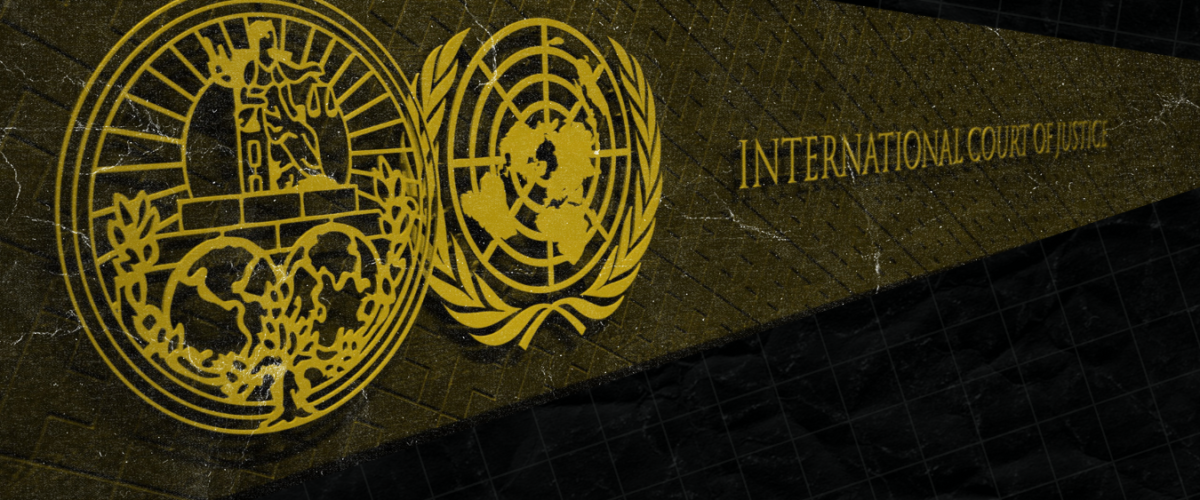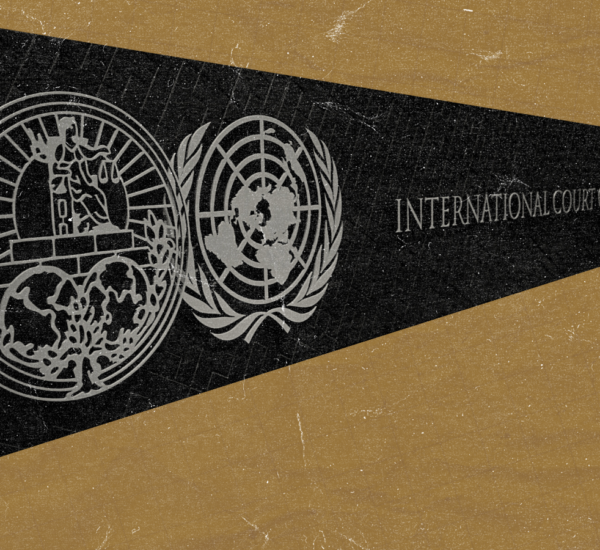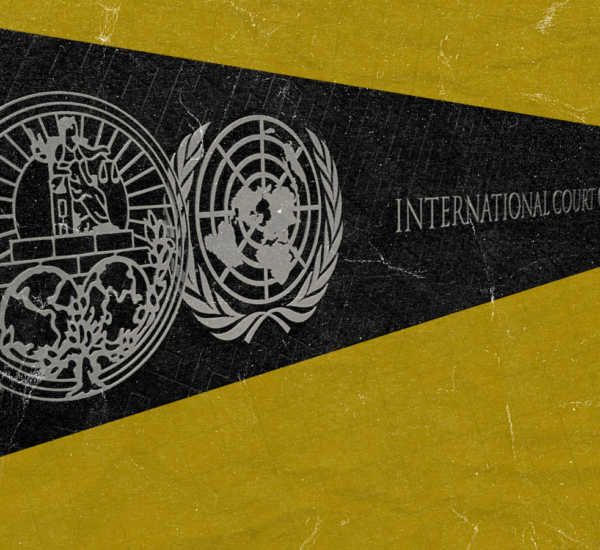Below is a summary of arguments put forth by South Africa in its Request for indication of provisional measures in the Application of the Convention on the Prevention and Punishment of the Crime of Genocide in the Gaza Strip (South Africa v. Israel)
The summary of Israel’s arguments will be uploaded on 13th January, 2024.
Introduction
On 29th December 2023, South Africa filed an application instituting proceedings against Israel before the International Court of Justice [“ICJ”], concerning alleged violations by Israel of its obligations under the Convention on the Prevention and Punishment of the Crime of Genocide [“Genocide Convention”] in relation to Palestinians in the Gaza strip.
South Africa claims that Israel has breached its obligations under the Genocide Convention by committing genocidal acts with specific intent against Palestinians in Gaza; by failing to prevent genocide against Palestinians in Gaza; and by failing to prosecute public incitement to genocide. As immediate relief, South Africa has requested the ICJ to indicate certain provisional measures to ensure Israel’s compliance with its obligations under the Genocide Convention to not engage in genocide, and to prevent and punish genocide. South Africa has also requested that the ICJ direct Israel to preserve relevant evidence, so that its claim of genocide can be adjudicated fairly. South Africa’s application instituting proceedings before the ICJ is available here.
South Africa’s submissions – overview
South Africa claims that Israel’s military campaign violates Art. II of the Genocide Convention because it is targeted to systematically eliminate Palestinians in Gaza with specific intent. Before the ICJ finally decides on this claim, South Africa has requested that the court indicate certain provisional measures to ensure immediate relief for Palestinians in Gaza, in light of the ongoing conflict. For the ICJ to accede to South Africa’s request, South Africa must demonstrate that the ICJ has (i) prima facie jurisdiction, (ii) that South Africa’s claims are at least plausible, and that there is an (iii) urgent and imminent risk of irreparable prejudice. South Africa’s legal representatives argued each of these claims before the ICJ on 11 January, 2024.
Oral arguments
Agent for South Africa, His Excellency Ambassador Vusimuzi Madonsela, opened South Africa’s case against Israel. Describing Israel’s recent actions in Gaza as an ongoing nakbah, Mr. Vusi Madonsela asserted that Israel’s occupation of Gaza has historically denied Palestinians the right to self-determination and right to return. He asserted that Israel’s acts since October 7th 2023 are part of a continuum of illegal acts and violence perpetrated against Palestinians since 1948. As such, South Africa locates Israel’s genocidal actions against Palestinians in the 75-year apartheid, a 56-year occupation, and a 16-year siege of the Gaza strip. After these preliminary observations, Hon’ble Mr. Ronald Lamola, Minister of Justice and Correctional Services of South Africa, delivered substantive opening remarks for South Africa. Although Mr. Lamola unequivocally condemned Hamas’s actions on 7th October 2023, he asserted that no armed attack, regardless of its severity, can justify a breach of the Genocide Convention.
Opening remarks
Israel’s acts of genocide
Dr. Adila Hassim argued that Israel is in breach of Art. II of the Genocide Convention because it has engaged in mass killing of Palestinians in Gaza [Art. II(a)], causing serious mental and bodily harm to Palestinians in Gaza [Art. II(b)], and imposing conditions calculated to destroy the Palestinian national, racial, and ethnic group [Art. II(c)]. Dr. Hassin argued that the ICJ need not finally decide the merits of South Africa’s claim against Israel while indicating provisional measures, for at this stage, it is sufficient to establish that at least some of the acts may constitute genocide under the Convention.
She argued that Israeli forces have killed over 23,000 Palestinians since October 2023 and that 7,000 more Palestinians are missing, presumed dead. Nearly 60,000 Palestinians are wounded and maimed, the majority of whom are women and children. Palestinians in Gaza are subjected to relentless bombing wherever they go: in their homes, shelters, mosques, churches, hospitals, and schools; with up to 6000 bombs a week, and on over 200 occasions, with 2000-pound bombs that spread indiscriminate devastation. Israel’s military campaign and siege has forcibly displaced Palestinians from their homes in Gaza, denied them food, water, shelter, sanitation, and medical care; all of which is geared towards bringing about their destruction as a group.
Israel’s genocidal intent
Adv. Tembeka Ngcukaitobi argued that an extraordinary feature in the case is that Israel’s political leaders and military commanders have publicly declared their genocidal intent against Palestinians. On 28th October 2023, Israel’s Prime Minister Benjamin Netanyahu invoked Amalek, which refers to the historical destruction of a group of people by Israelites, as Israeli forces prepared their ground invasion of Gaza. The Deputy Speaker of Knesset, Israel’s Parliament, called for the erasure of the Gaza strip from the face of the earth and the Israeli Minister of Defence referred to Palestinians in Gaza as “human animals”. Adv. Ngcukaitobi urged that this language of dehumanization reveals Israel’s genocidal intent.
Through audio-visual clippings, Adv. Ngcukaitobi demonstrated that this genocidal rhetoric spurred the Israeli ground offensive. Israeli soldiers repeated these statements as they celebrated their destruction of Gaza. On December 7th, 2023, Israeli soldiers used their Prime Minister’s message of Amalek to justify the killing of civilians and children. Adv. Ngcukaitobi rejected the claim that Israeli officials did not truly mean what they said, or that Israeli soldiers misunderstood these statements. Israeli officials gave orders to destroy and maim what could not be destroyed – directions issued by those in command that reflected state policy. Adv. Ngcukaitobi emphasized that several other countries and UN officials have also warned that Israel’s actions in Gaza constitute a genocide in the making.
ICJ’s prima facie jurisdiction
Prof. John Dugart argued that at the stage of issuing provisional measures, it is enough to show the existence of a prima facie dispute over Israel’s obligations under the Genocide Convention. He located the ICJ’s jurisdiction under Art. 36 of the ICJ Statute and under Art. IX of the Genocide Convention.
He also argued that the prohibition against genocide is a universal rule that no state can violate, and that the Genocide Convention obligates states to take measures to prevent genocide. Prof. Dugart argued that states owe this obligation to prevent genocide to the international community as a whole. He explained that unlike other treaties, the Genocide Convention does not require states to enter into negotiations before submitting a dispute to the ICJ. If a state party is believed to be indulging in genocide or not meeting its obligation to prevent genocide, another state party can bring the issue before the ICJ.
Nature of rights requiring protection and their link with provisional measures sought
Prof. du Plessis argued that at this stage, South Africa need only show that the rights claimed by South Africa, for which it seeks provisional measures, are at least plausible. This does not require the court to definitively find that the right sought to be protected by South Africa exists. Rather, it must be grounded in a possible interpretation of the Genocide Convention. Palestinians, he submitted, have a right to exist. Israel’s occupation and violence in Gaza violates this right.
He emphasized that at this stage, Israel’s actions are capable of being described as at least plausibly genocidal, considering the clear intentionality reflected in statements of Israeli soldiers and officials. This can also be inferred from Israel’s pattern of violent conduct against Palestinians in Gaza. He also submitted that it is at least plausible that Israel has failed to prevent genocide in Gaza. Considering the gravity of the situation in Gaza, Prof. du Plessis highlighted the importance of the court’s powers to issue provisional measures. He implored the court to consider its responsibility to the international community and not limit its own jurisdiction by denying South Africa’s request.
Urgent and imminent risk of irreparable prejudice
Ms. Blinne Ni Ghralaigh contended that there is an urgent, real, and imminent risk of irreparable prejudice if the ICJ denies South Africa’s request for provisional measures. She demonstrated this urgency by relying on statements and reports by UN agencies that describe Gaza as a crisis of humanity, a living hell, a bloodbath, and a situation of utter deepening and unmatched horror. She flagged Israel’s repeated attacks on hospitals and other medical infrastructure in Gaza, the systematic denial of food and water to Palestinians in Gaza, and Israel’s elimination of swathes of villages, towns, and refugee camps in Gaza from the map. With UNSC resolutions calling for humanitarian assistance remaining unimplemented and UNGA resolutions calling for ceasefire being ignored, Ms. Blinne Ni Ghralaigh argued that the need for provisional measures would not be more urgent.
She demonstrated that the scale of destruction and violence in Gaza is unprecedented. Refusing to indicate provisional measures would be a departure from the ICJ’s jurisprudence. Ms. Blinne Ni Ghralaigh powerfully closed her submissions by reminding the ICJ that in this case, the very reputation of international law, and its ability to bind and protect all peoples, hangs in the balance.
Provisional measures
Prof. Lowe argued that any future undertaking by Israel at this stage would not mitigate the risk of irreparable harm. There would be no end to the destruction of Gaza without an unambiguous direction to Israel to halt its military activity. Prof. Lowe also preempted Israel’s claim of acting in self-defence under Art. 51 of the UN Charter. He argued that Israel is an occupying power in Gaza and that it exercises effective control over the region. A claim of self-defence cannot be invoked by an occupying force. He argued that in any case, no matter how egregious a provocation or how appalling an attack against Israel, genocide can never be a permissible response under international law. Every use of force, whether in self-defense, as an exercise of police powers, or as enforcing an occupation; must be within the limits set by international law. The rule against committing genocide permits no exceptions. Prof. Lowe submitted that the ICJ should certainly not make any exception in a hearing for provisional measures, and permit a state to violate its obligations under the Genocide Convention.






[…] Quellen: Link zu einer kurzen Zusammenfassung […]